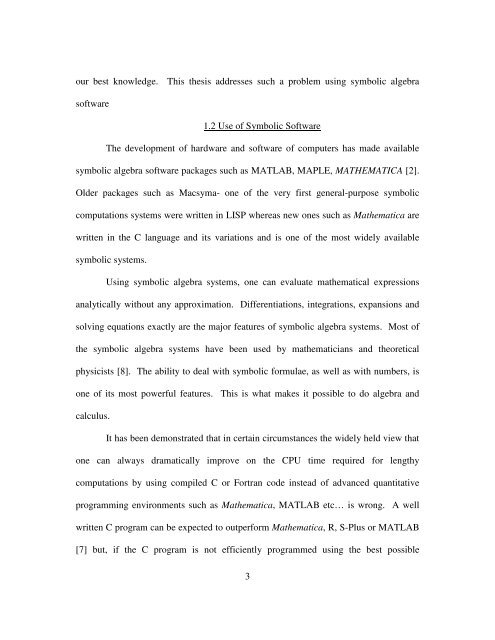AIRY STRESS FUNCTION FOR TWO DIMENSIONAL INCLUSION ...
AIRY STRESS FUNCTION FOR TWO DIMENSIONAL INCLUSION ...
AIRY STRESS FUNCTION FOR TWO DIMENSIONAL INCLUSION ...
You also want an ePaper? Increase the reach of your titles
YUMPU automatically turns print PDFs into web optimized ePapers that Google loves.
our best knowledge. This thesis addresses such a problem using symbolic algebra<br />
software<br />
1.2 Use of Symbolic Software<br />
The development of hardware and software of computers has made available<br />
symbolic algebra software packages such as MATLAB, MAPLE, MATHEMATICA [2].<br />
Older packages such as Macsyma- one of the very first general-purpose symbolic<br />
computations systems were written in LISP whereas new ones such as Mathematica are<br />
written in the C language and its variations and is one of the most widely available<br />
symbolic systems.<br />
Using symbolic algebra systems, one can evaluate mathematical expressions<br />
analytically without any approximation. Differentiations, integrations, expansions and<br />
solving equations exactly are the major features of symbolic algebra systems. Most of<br />
the symbolic algebra systems have been used by mathematicians and theoretical<br />
physicists [8]. The ability to deal with symbolic formulae, as well as with numbers, is<br />
one of its most powerful features. This is what makes it possible to do algebra and<br />
calculus.<br />
It has been demonstrated that in certain circumstances the widely held view that<br />
one can always dramatically improve on the CPU time required for lengthy<br />
computations by using compiled C or Fortran code instead of advanced quantitative<br />
programming environments such as Mathematica, MATLAB etc… is wrong. A well<br />
written C program can be expected to outperform Mathematica, R, S-Plus or MATLAB<br />
[7] but, if the C program is not efficiently programmed using the best possible<br />
3
















